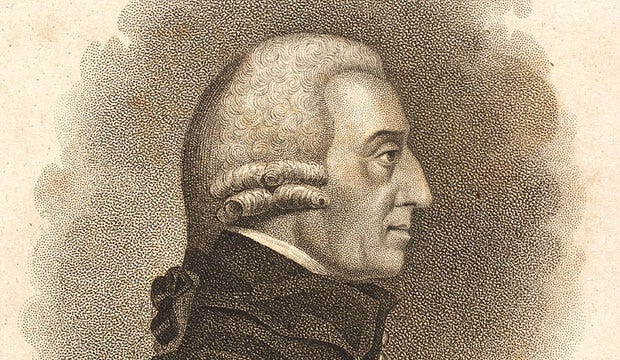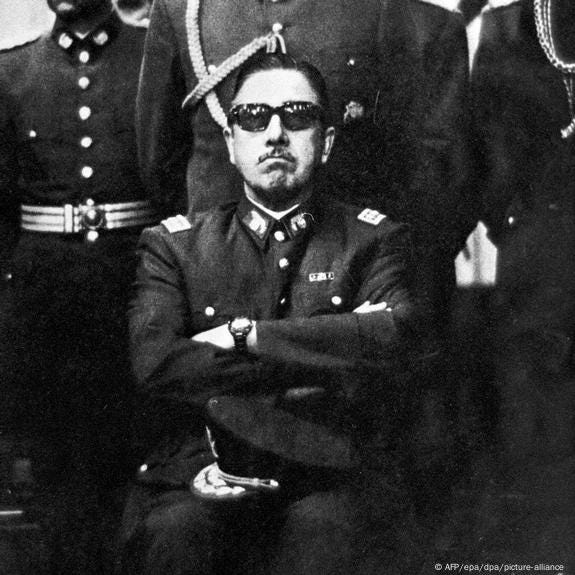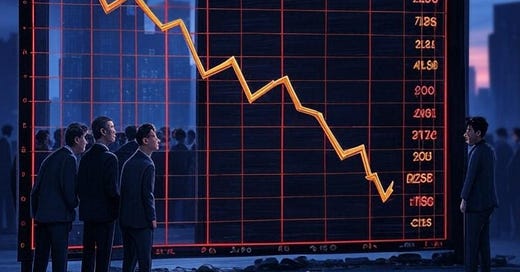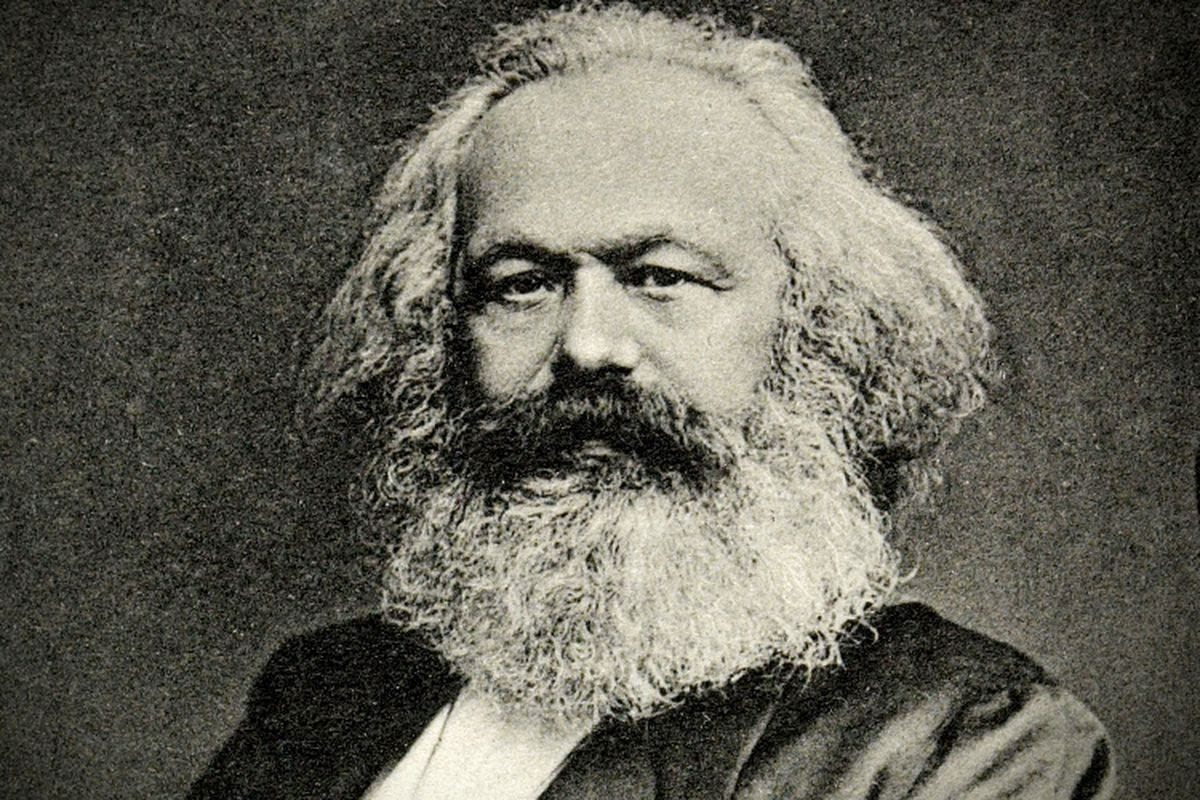This essay by Alain de Benoist, «L’erreur du liberalism», was originally published in Éléments issue no. 28-29 in March 1979. Alain de Benoist argues that both liberalism and Marxism, while seemingly opposed, share the same fundamental flaw of reducing human society to economic relationships and viewing humans primarily as economic actors. The essay criticizes how liberalism, in the name of universal equality and individual freedom, actually replaces traditional social hierarchies with economic inequalities while eroding cultural identities, community bonds, and the power of the state.
Translated by Alexander Raynor
The conception of man as an "economic animal/being" (Adam Smith's and his school's Homo oeconomicus) is the very symbol that connotes both bourgeois capitalism and Marxist socialism. Liberalism and Marxism were born as opposing poles of the same system of economic values. One defends the "exploiter," the other defends the "exploited" - but in both cases, we don't escape economic alienation.
Liberals (or neo-liberals) and Marxists agree on one essential point: for them, the determining function of a society is the economy. It constitutes the real infrastructure of any human group. It is its laws that allow for "scientific" assessment of human activity and prediction of behaviors. In economic activity, Marxists give the predominant role to the mode of production; liberals give it to the market. It is the mode of production or the mode of consumption ("starting" economy or "arriving" economy) that determines social structure. In this conception, material well-being is the only goal that civil society consents to assign itself. And the means adapted to this goal is the free exercise of economic activity.
Essentially defined as economic agents, humans are assumed to always be capable of acting according to their "best interest" (economic). That is, for liberals: towards more material well-being. And for Marxists: according to their class interests - with class itself being determined, ultimately, by its position relative to the means of production. We are dealing with a fundamentally optimistic system: man is naturally "good" and "rational"; his "natural" tendency leads him to constantly discern where his (economic) interest lies and what means will achieve it, such that whenever given the possibility, he chooses the solution that brings him the greatest "advantage." It is also a rationalist system, built entirely around the (still unproven) postulate of the "natural rationality" of individual choices - particularly those of the consumer or entrepreneur. As for the "advantage" and "interest" that the individual supposedly seeks, they remain poorly defined. What type of "interest" is it? Against what value system should we assess "advantage"? Faced with these questions, liberal authors show the same reluctance as Marxist authors when it comes to defining the "classless society." They unanimously postulate, however, that individual interest coincides with general interest - which is merely the sum of certain individual interests arbitrarily considered as non-contradictory.
This general theory is presented as both empirical and normative - although one cannot always easily distinguish what comes from "experimental data" and what comes from "norms." Indeed, not only is it affirmed that man automatically seeks his "individual advantage," but it is declared, explicitly or not, that such behavior is "natural," and consequently preferable. Behavior motivated by economic reasons thus becomes the best possible behavior.
The emergence of Homo oeconomicus theory went hand in hand with the emergence of economics as a science - though a "science" that is always thwarted by the unpredictable, that is, by a human factor that cannot be rationally apprehended, and which the proponents of "economism" strive to reduce through a process equivalent to dispossessing man of what is properly his (historical consciousness).
Indeed, there can only be "economic science" if the economy constitutes an autonomous sphere, that is, a sphere depending on no laws but its own, and whose imperatives cannot be subordinated to other imperatives considered superior. On the contrary, if the economy is only a subordinate sphere, then "economic science" becomes merely a technique or a methodology "with variable geometry": as a discipline, it is only the historical description or classification of means appropriate to achieve this or that intention with non-economic motivations. Finally, if economics is a "science" and if it is also the determining function of social structure, then man is no longer master of his destiny, but the object of "economic laws," whose ever-deeper understanding allows us to elucidate the meaning of history. Historical development is shaped by economic data; man is acted upon by this data; the world necessarily moves towards "ever more progress" (or towards the "classless society").
Economism thus appears as an initial "secularization" of the Judeo-Christian theory of historical meaning. Hence M. Henri Lepage's observation that liberal theory initially relied, parallel to the emergence of the concept of property, on "the slow maturation of the philosophy of progress conveyed by the Judeo-Christian tradition and its new 'vectorial' (= linear) vision of history - as opposed to the 'circular' (= cyclical) vision of the ancient world" (Autogestion et capitalisme (TN: Self-Management and Capitalism), Masson, 1978, p. 209). "Economic factors alone," adds Mr. Lepage, "would not have been enough to give birth to a new civilization in profound rupture with the previous one if, simultaneously, the diffusion of the Judeo-Christian mental universe had not contributed to shaping a new spirit" (ibid.).
Liberalism is not just that, however. Historically speaking, it primarily amounts to, as Mr. Thierry Maulnier noted, a "claim for freedom for the new forms of power that arise facing the State and for the men who wield them" (La société nationale et la lutte des classes (TN: The National Society and The Class Struggle), in Les Cahiers de combat, 1937). Liberalism, in other words, is the doctrine by which the economic function emancipated itself from political control - and justified this emancipation.

Regarding the State, liberalism manifests itself in two ways. On one hand, it strongly criticizes it, commenting on its "inefficiency" and denouncing the "dangers of power." On the other hand, and in a second phase, it tries to make it tip into the economic sphere, to depoliticize it and reverse the old hierarchy of functions. As it develops, the economic caste draws to itself the substance of the State, gradually subordinating political decision-making to economic imperatives (and producing, as a counter-effect, the transfer of political authority to other places). The State, therefore, must do as little politics as possible. It must also not substitute itself for economic decision-making centers. Its only task is to maintain order and security without which there is no freedom of commerce, to defend (economic) property, etc. In exchange, it must also ask for as little as possible, protect merchants by giving them complete freedom to act - in short, no longer be the master, but rather the slave of those who, better informed than it about the "laws of economics" (which are the determining laws within society), are also better positioned to organize the world according to their "best interest." Constant and Jean-Baptiste Say describe the State as a necessary evil, a sad necessity, a clumsy agent whose prerogatives must constantly be reduced (system of "checks and balances") while awaiting the blessed day when we can get rid of it. This idea has never ceased to inspire liberal theorists - and it is remarkable that at its end point, it overlaps with Karl Marx's thesis on the withering away of the State.
Meanwhile, the idea of equality, torn from the theological sphere, is in turn secularized and brought down to earth in the name of a secular metaphysics, centered on a hypostasized abstraction that the legal theory of natural law delights in: "human nature." In the Encyclopédie, François de Jaucourt (1704-1779) writes: "Natural or moral equality is founded on the constitution of human nature common to all men, who are born, grow, subsist and die in the same way. Since human nature is found to be the same in all men, it is clear that according to natural law each must esteem and treat others as beings who are naturally equal to him."
This postulate of "natural equality" is implied from the start in the theory. Indeed, if humans were not fundamentally equal, they would not all be capable of acting "rationally" according to their "best interest." Nevertheless - it's worth emphasizing - the implementation of this theory of "natural" equality essentially results in substituting economic inequalities for non-economic inequalities. Previously, one was rich because one was powerful. Today, one is powerful because one is rich. Economic superiority, unjustifiable when it is not the corollary of spiritual superiority, becomes the decisive factor: if an individual earns more money, therefore they must be more right. Economic success becomes synonymous with success itself (or, in the Calvinist system, with higher morality).
The spirit of competition, when it is not completely annihilated (as in communist societies), is also confined to a single domain: the learning of economic performance selects the "best," that is, those who prove most apt at the "struggle for life" according to the laws of merchant society (social Darwinism). One eliminates birth "privileges," hereditary aristocrats, and feudal orders. But at the same time, one establishes the economic jungle in the name of universal equality and the freedom of the fox in the henhouse: remaining inequalities are attributed to laziness or lack of foresight, while creating, simultaneously - systole calls for diastole - the conditions for socialist escalation.
This deviated conception of freedom and this false idea of equality result in stripping the individual of their belongings: of all the inclusions that make them participate in a collective identity. In the liberal system, only the individual dimension counts - along with its antithesis, "humanity"; all intermediate dimensions - nations, peoples, cultures, ethnicities, etc. - tend to be denied, disqualified (as "products" of political and historical action, and as "obstacles" to freedom of commerce) or considered insignificant.
Individual interest takes precedence over community interest. "Human rights" exclusively concern the isolated individual - or "humanity." Real individuals are perceived as reflections, "incarnations" of an abstract concept of universal Individual. Society, which European tradition regarded as integrating the individual (in the sense that an organism integrates its component organs into a higher order), finds itself stripped of its specific properties: it becomes nothing more than a sum of individual properties. The nation is nothing more than the addition of its inhabitants at a given moment. It is now defined as a collection of subjects arbitrarily considered sovereign, free, and equal. Political sovereignty itself is reduced to the individual level. With any transcendence of the principle of authority banned, power becomes merely a delegation made by individuals, whose votes add up during elections - a delegation that regularly expires and for which power must account as a board chairman would to his shareholders' assembly. The "sovereignty of the people" is not at all that of the people as a people, but rather the indecisive, contradictory, and manipulable sovereignty of the individuals who compose this people.
Since individuals are equal and take precedence over communities, uprooting becomes the rule. Social mobility, an economic necessity, has the force of law. Practice, aiming to realize theory, favors the abolition of differences, possibly qualified as "unjust" - since they stem from the accident of birth. This implies, as Mr. Pierre-François Moreau emphasizes, "breaking natural communities, organic metaphors, historical traditions that risk enclosing the subject in a whole they are not supposed to have chosen" (Les racines du libéralisme (TN: The Roots of Liberalism), Seuil, 1978, p. 11). The organic conception of society, derived from observing the living world, is replaced by a mechanical conception, inspired by social physics. One denies that the State can be likened to the family (Locke), one denies that society is a body, etc.
Indeed, one of the major characteristics of liberal economics is its indifference and irresponsibility toward cultural heritage, collective identities, national heritage and interests. The sale of national artistic treasures to foreign buyers, the interpretation of "utility" in terms of short-term commercial profitability, the dispersal of populations and systematic organization of migrations, the transfer to "multinational" companies of ownership or management of entire sectors of national economies or technologies, the free diffusion of exotic cultural fashions, the subjugation of media to ways of thinking and speaking tied to the development of current political or ideological superpowers, etc. - all these characteristics of current Western societies logically derive from implementing the main postulates of liberal doctrine. Rootedness, which requires certain cultural continuity and relative stability in living conditions, can only clash with the leitmotif of permissive nomadism summarized by the liberal principle: "laissez-faire, laissez-passer" (let do, let pass).







